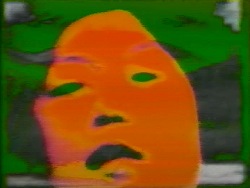SHIGEKO KUBOTA: Daylong Tribute Screening at EAI
SHIGEKO KUBOTA: Daylong Tribute Screening at EAI
|
EAI pays tribute to Shigeko Kubota (1937-2015) with a daylong screening of her remarkable video works. The program, which spans a period of thirty-five years, features twelve works by one of video art's pioneering figures. The featured works range from Kubota's deeply personal Broken Diary series, which includes Europe on ½" a Day (1972) and My Father (1973-75), to documents of her multi-media installations and Duchampiana sculptures (1970-94), and pieces such as Rock Video: Cherry Blossom (1986), which fuse natural landscape and electronic processing. Honoring Kubota's life and art through a daylong immersion in her video works, the program will screen at multiple scheduled times throughout the day, and will be free and open to the public.
| ||

Video Girls and Video Songs for Navajo Sky (1973), Shigeko Kubota |
Wednesday, September 9 11:00 am - 8:15 pm Electronic Arts Intermix (EAI) 535 West 22nd Street, 5th Fl. New York, NY 10011 www.eai.org Admission Free |
|
|
In a career that spanned five decades, Kubota created a thoroughly unique body of video sculptures, performances, multi-media installations, and single-channel videos. Forging a confluence of video technology with images and objects from nature, art, and everyday life, Kubota's works resonate with a sensibility that is at once forceful, poetic and witty. Kubota was a key participant in the international Fluxus movement in the 1960s, and was named Vice Chairman of the Fluxus Organization in 1964. After moving to New York from Japan that same year, she made an indelible mark with her Vagina Performance at the 1965 Fluxfest.
__________________________________
Shigeko Kubota was born in 1937 in Niigata, Japan. She received a B.A. in sculpture from Tokyo University of Education, and studied at New York University and the New School for Social Research. In 1964, she moved to New York, and in the same year became the Vice Chairman of the Fluxus Organization. She taught at the School of Visual Arts, and was video artist-in-residence at both Brown University and the School of the Art Institute of Chicago. From 1974 to 1982 she was the Video Curator at Anthology Film Archives in New York. Kubota was the recipient of numerous grants and awards, including a Deutscher Akademischer Austauschdienst (DAAD) Fellowship in Berlin, National Endowment for the Arts Fellowships, New York State Council on the Arts grants, a Guggenheim Fellowship, a Rockefeller Foundation Fellowship, and an NEA/Visual Arts grant. Her work is in the permanent collections of The Museum of Modern Art, New York, and the Toyama Museum of Art, Japan, among others. Kubota's video sculptures, installations and videos have been exhibited internationally at institutions including the Rene Block Gallery, New York; The Museum of Modern Art, New York; Documentas 6 and 8, Kassel, Germany; Folkwang Museum, Essen, Germany; Kunsthaus, Zurich; Stedelijk Museum, Amsterdam; Kulturhuset, Stockholm; Japan Society, New York; The Kitchen, New York; New Langton Arts, San Francisco; Kongress Halle, Berlin; and the Museum of Contemporary Art, Chicago. She participated in the 1990 Venice Biennale and the 1990 Sydney Biennale. A retrospective of her work was presented at the American Museum of the Moving Image, New York in 1991. In 1996, she was the subject of a one-person show at the Whitney Museum of American Art, New York.
___________________________________
About EAI
___________________________________
Electronic Arts Intermix
EAI on Facebook
___________________________________
EAI's Public Programs are supported in part by the New York State Council on the Arts, with the support of Governor Andrew Cuomo and the New York State Legislature, and the New York City Department of Cultural Affairs, in partnership with the City Council. EAI also receives program support from the Andy Warhol Foundation for the Visual Arts.
|
||
Description
Press Release for SHIGEKO KUBOTA: Daylong Tribute Screening at EAI, September 9, 2015
